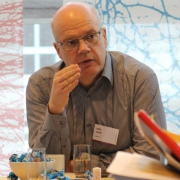The Industrial Strategy Challenge Fund Medicines Manufacturing Challenge formally closed at the end of September so it’s time for some reflection. It definitely feels like the end of something. So we’ve spent the last few months formally closing the challenge with the same level of diligence and expertise as they have shown through every stage of the process.
Time to evaluate
The obvious questions are:
- how have we done?
- what have we achieved?
- was it all worth it?
I have driven our independent evaluators, Ipsos, to distraction when reviewing their 92-page evaluation report with my question “That’s all very interesting but how many marks would you give us out of 10?”
They have pointed out my naivety in wanting such a simple measure. We all yearn for validation and when we watch a sporting event, appreciating the skill, and effort we rarely last long before asking “What’s the score?”
Our advisory board also gently mocked me and pointed out that the stories about what we have achieved are as important as all the evaluation measures. The problem is the story is a big one, long and rich in detail with heroes, and adventures but too long for a blog.
What we set out to do
The aim of the challenge was to support innovation in the medicines manufacturing industry in the UK to drive economic growth and underpin healthcare resilience. Look out for the publication of our evaluation report in the coming weeks but at a high level I think we have done a remarkable job.
Our challenge funded a cohort of collaborative research and development projects in medicines manufacturing and digital health together with a few large infrastructure investments.

Credit: ArLawKa AungTun, iStock, Getty Images Plus via Getty Images
What has been achieved
Our investment to date has resulted in the creation of more than 700 jobs and supported 230 apprentices (surpassing an original target of 50). Over 600 cross sector collaborations have created 118 new products and 140 services, and the companies involved have attracted £720 million of additional investment.
As a team we are particularly proud of our infrastructure investments, I would call out the strategic investment in Advanced Therapy Medicinal Products (ATMPs) as a great example. It is such a simple story.
Government identified ATMPs (medicines based on genes, tissues or cells) as groundbreaking new opportunities for a sector of high growth potential. They then commissioned a taskforce of industry, academia, research technology organisations and UK Research and Innovation (UKRI) to recommend what needed to be done.
The report’s recommendations are endorsed by the government, and the Medicines Manufacturing Challenge is charged with delivery of the recommendations working closely with the established Cell and Gene Therapy Catapult.

Credit: Oselote, iStock, Getty Images Plus via Getty Images
Cells, genes and medicine
The success of the sector is nicely summarised on the Cell and Gene Therapy website. A similar story could be told around the impact of the Medicines Manufacturing Innovation Centre (MMIC). Though the case for investment here was much more industry driven with strong support from the Medicines Manufacturing Industry Partnership.
Although this is a very new capability MMIC is already transforming the way medicines are developed manufactured and delivered to patients. To identify areas to work in the challenge always set out to work with:
- industry
- academia
- government
- the third sector
The Vaccines Manufacturing Innovation Centre is a good example of how leading academics and charities like Welcome and Coalition for Epidemic Preparedness Innovations identified the need for investment. It was also an area that met a societal need and could deliver economic growth to the UK.
Although the facility could not be delivered in time to manufacture vaccines commercially, it has been recognised as accelerating the development of the Oxford AstraZeneca vaccine. This delivered multibillion value in helping to lift lockdown earlier as well as saving lives.
Job done?
That is my high-level view on the story – it’s really just a list of contents and we will hopefully tell the story of various chapters in upcoming blogs. In the meantime, maybe we shouldn’t worry about the score. The upcoming evaluation numbers will forensically analyse our performance.
The next volume of our story is about to be written through the Transforming Medicines Manufacturing Challenge. So in reality I think this is partly ‘job done’ but mostly ‘just begun.
Video credit: Innovate UK KTN
On-screen captions and an autogenerated transcript are available on Vimeo.
Further information
Connect with Innovate UK on LinkedIn
Follow Innovate UK on Facebook
You can go to the new Innovate UK website
You can go to the Innovate UK EDGE website




